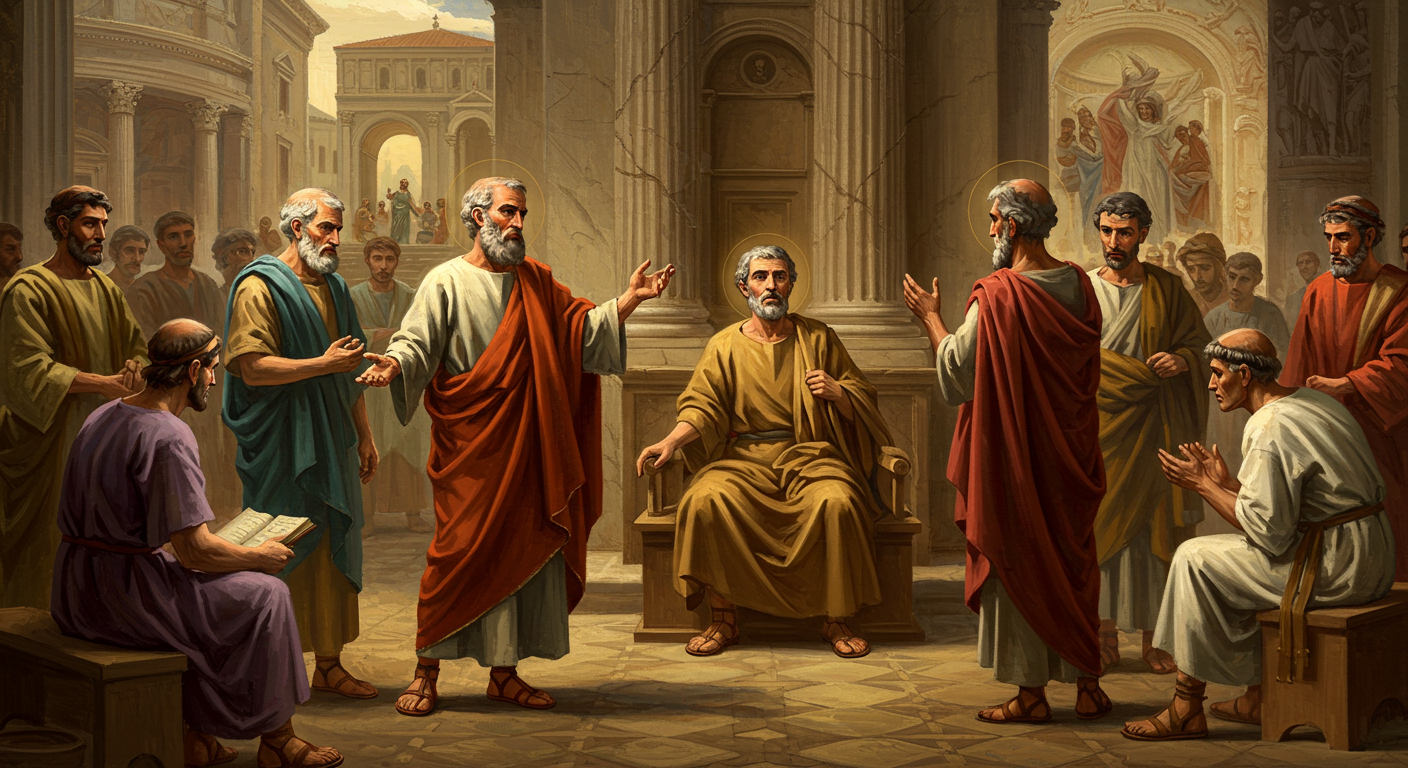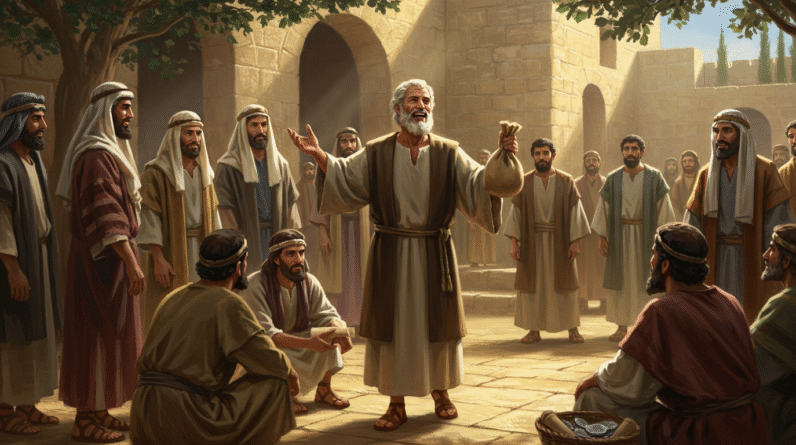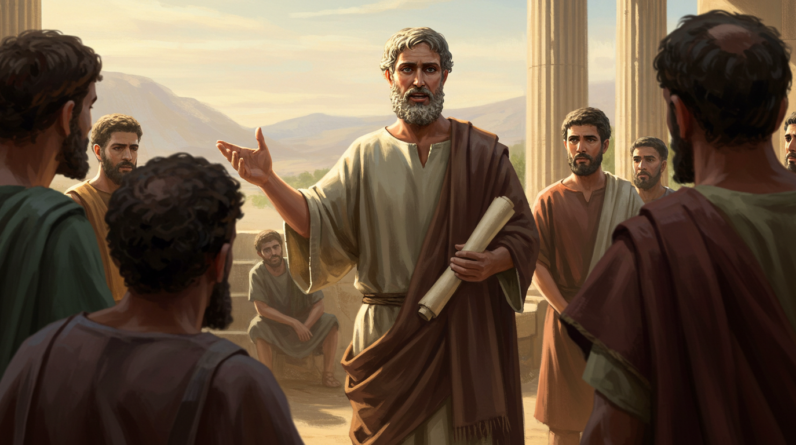Dive into early church history with our post on Galatians, uncovering the pivotal roles of leaders like Paul, Peter, and Barnabas in shaping Christianity.
Galatians: Exploring the Role of Key Early Church Leaders
Introduction
In the vast tapestry of early Christian history, several figures stand out for their remarkable contributions to the growth and establishment of the church. Among these pioneering leaders, individuals like Paul, Peter, and Barnabas played crucial roles in evangelizing and nurturing the nascent Christian community. These leaders were instrumental in spreading the teachings of Jesus, navigating the complex landscape of religious and cultural tensions, and establishing the foundations of Christian doctrine. The book of Galatians offers a fascinating window into their efforts and challenges, encapsulating their journey and legacy in a vibrant narrative that continues to inspire believers today.
The Apostle Paul, perhaps one of the most notable figures in the early church, is celebrated for his missionary zeal and theological insights. His letter to the Galatians encapsulates his passion and vision for the gospel, reminding us of the vibrant and sometimes tumultuous beginnings of Christianity. Paul’s work among the Gentiles, as captured in Galatians 2:9, is a testimony to his leadership and dedication to the early church’s mission. Enveloped in historical context, this letter becomes more than just a scriptural guide; it is a personal, reflective account of the trials and triumphs of spreading the gospel.
Paul: A Key Early Church Leader and Evangelist to the Gentiles
Background and Calling
Paul’s story, formerly known as Saul of Tarsus, is one marked by dramatic transformation. Born a Roman citizen and educated in Judaism under Gamaliel, Paul initially harbored strong opposition towards followers of Jesus. His zealous adherence to traditional Jewish law brought him into direct conflict with the emerging Christian sect. However, Paul’s life took a radical turn on the road to Damascus when he encountered the risen Christ. This encounter not only transformed his heart but also redirected his life’s purpose toward evangelism. This calling is vividly chronicled in Acts 9:3-6, where Paul’s life was forever changed by a divine vision.
Leadership in the Early Church
Paul’s influence in the early church was immense. A prolific church planter and theological thinker, Paul ventured across Asia Minor and Europe, establishing communities rooted in the love and teachings of Christ. He was integral to the structural development of these communities, advocating for the inclusivity of Gentiles without the rigid adherence to Jewish ceremonial laws. His assertive approach is evident in his epistles, where he often addressed disputes and crafted a coherent theological framework for believers. His leadership helped in resolving conflicts, guiding the church through doctrinal controversies, as seen in the Jerusalem Council outlined in Acts 15.
Evangelism and Missionary Work
Paul’s evangelical legacy is characterized by his missionary journeys and heartfelt letters to the churches he helped establish. Traveling extensively across the Roman Empire, Paul tirelessly preached, taught, and mentored emerging leaders. His journeys, carefully documented in the book of Acts, highlight the extent of his dedication and resilience. Through his ministry, key communities in cities like Corinth, Ephesus, and Philippi were founded, and many individuals came to faith through his teaching. Paul’s letters continue to resonate, offering spiritual guidance and encouragement to believers worldwide.
Challenges and Perseverance
The journey of evangelism was not without its challenges for Paul. Subjected to persecution, imprisonment, and physical hardships, Paul faced intense opposition from religious authorities and political entities alike. Despite these trials, his unwavering faith and commitment to the gospel message never waned. In 2 Corinthians 11:24-28, Paul offers a candid account of the various hardships he endured, serving as a testament to his enduring tenacity and belief in his divine mission.
Key Bible Passages About Paul
Paul’s life and ministry are extensively chronicled in the New Testament. Significant passages include his conversion in Acts 9:3-6, his participation in the Jerusalem Council in Acts 15, and his articulation of faith and grace in Galatians 2:9. These passages collectively highlight not only his theological contributions but also his lived experiences as an apostle.
Lessons from the Life of Paul
Modern Christians can draw numerous lessons from Paul’s life and ministry. His fervent dedication to spreading the gospel, even in the face of persecution, serves as a powerful reminder of the transformative power of faith. Paul’s story encourages believers to embrace their calling, remain steadfast amid trials, and be open to God’s direction, even when it disrupts our preconceived paths. His life exemplifies the importance of resilience, adaptability, and reliance on divine guidance.
Peter: Leadership and Unity in the Early Church
Background and Calling
Peter, originally known as Simon, was a fisherman by trade who became one of Jesus’ closest disciples. Upon meeting Jesus, he was given the name Cephas (or Peter), meaning “rock,” which signified his future role as a foundational leader in the church. Peter’s calling is illustrated in Matthew 4:18-20, where he leaves his nets to follow Jesus, embarking on a journey that would see him transition from a simple fisherman to a cornerstone apostle.
Leadership in the Early Church
Peter’s leadership was vital to the early church’s growth, especially among Jewish Christians. Post-Pentecost, his powerful sermons and pastoral influence were pivotal in establishing and unifying believers. Peter played a significant role at the Jerusalem Council, advocating for unity between Jewish and Gentile Christians as the church grappled with issues of law and grace. His leadership exemplified a deep commitment to fostering a cohesive and inclusive community, underpinning the church’s structural and doctrinal development.
Evangelism and Missionary Work
Though primarily focused on ministry in Jerusalem, Peter also engaged in missionary work that extended to other regions. His commitment to evangelism is notably captured in his encounter with Cornelius in Acts 10, where he crosses cultural barriers to preach to Gentiles, signaling a significant shift in the church’s outreach. This moment underscores Peter’s evolving understanding of God’s inclusive gospel, paving the way for broader Gentile mission work.
Challenges and Perseverance
Despite his leadership, Peter faced numerous personal and external challenges. Known for his initial denial of Jesus, Peter’s journey is one of redemption and growth. He encountered opposition and imprisonment, yet consistently chose to obey God over human authority. His resilience is further emphasized in Acts 5:29, where Peter declares his unwavering allegiance to God’s command.
Key Bible Passages About Peter
Significant moments in Peter’s journey include his calling in Matthew 4:18-20, his speech at Pentecost in Acts 2:14-41, and his vision in Acts 10. Each passage illuminates his evolving role from disciple to church leader.
Lessons from the Life of Peter
Peter’s life offers rich lessons in transformation, forgiveness, and leadership. His story encourages believers to embrace their shortcomings as opportunities for growth, trusting that failure is not final. His journey from denial to leadership resonates with those seeking redemption and purpose, while his emphasis on unity and inclusion remains a crucial lesson for today’s church.
Barnabas: Encouragement and Support in the Early Church
Background and Calling
Barnabas, born Joseph, was a Levite from Cyprus known for his generosity and encouragement. The apostles gave him the name Barnabas, which means “son of encouragement,” reflecting his gift for uplifting others. He first appears in the New Testament selling a field and donating the proceeds to the apostles in Acts 4:36-37, demonstrating his wholehearted support for the early Christian community.
Leadership in the Early Church
Barnabas played a crucial supporting role in the early church, particularly in mentoring emerging leaders like Paul. Recognizing potential in others, he advocated for Paul’s inclusion among the apostles and later worked alongside him on missionary journeys. His leadership style was marked by encouragement and humility, prioritizing community welfare and collaboration over personal prominence.
Evangelism and Missionary Work
Barnabas’s evangelistic work is closely tied to his partnership with Paul. They embarked on several missionary journeys together, spreading the gospel across regions such as Cyprus and Asia Minor. Barnabas’s compassion and relational approach facilitated the establishment of new churches and support for congregations struggling with issues of faith and practice. His role was vital in nurturing fledgling communities and fostering their spiritual growth.
Challenges and Perseverance
Despite his encouraging nature, Barnabas faced challenges, including disagreements with Paul. Notably, their split over John Mark’s participation in their missionary journey, recorded in Acts 15:36-41, highlights the complexities of church leadership. However, Barnabas’s steadfast commitment to reconciliation and support showcased his perseverance and dedication to unity.
Key Bible Passages About Barnabas
Barnabas is notably mentioned in the context of his encouragement and support roles in Acts 4:36-37, his partnership with Paul in Acts 13:2, and the disagreement in Acts 15:36-41. These passages highlight his influence and contributions to early church dynamics.
Lessons from the Life of Barnabas
Barnabas’s legacy of encouragement offers profound lessons in mentorship and support. His willingness to uplift others and prioritize community welfare encourages modern Christians to engage in supportive and selfless leadership. His life invites us to embrace a spirit of generosity and encouragement, fostering environments where others can thrive and succeed.

Conclusion
Paul, Peter, and Barnabas each embodied unique aspects of leadership and evangelism that significantly shaped the early church. Their contributions, while distinct, collectively highlight a commitment to the gospel, perseverance amid challenges, and a dedication to fostering inclusive and supportive community dynamics. Their stories provide enduring lessons that continue to inspire and guide believers in their faith journey today. As we explore the vibrant narrative of early church history, let us draw inspiration from these leaders’ lives, commit to studying their contributions, and strive to emulate their example in spreading the gospel.
Acknowledgment: All Bible verses referenced in this article were accessed via Bible Gateway (or Bible Hub).







